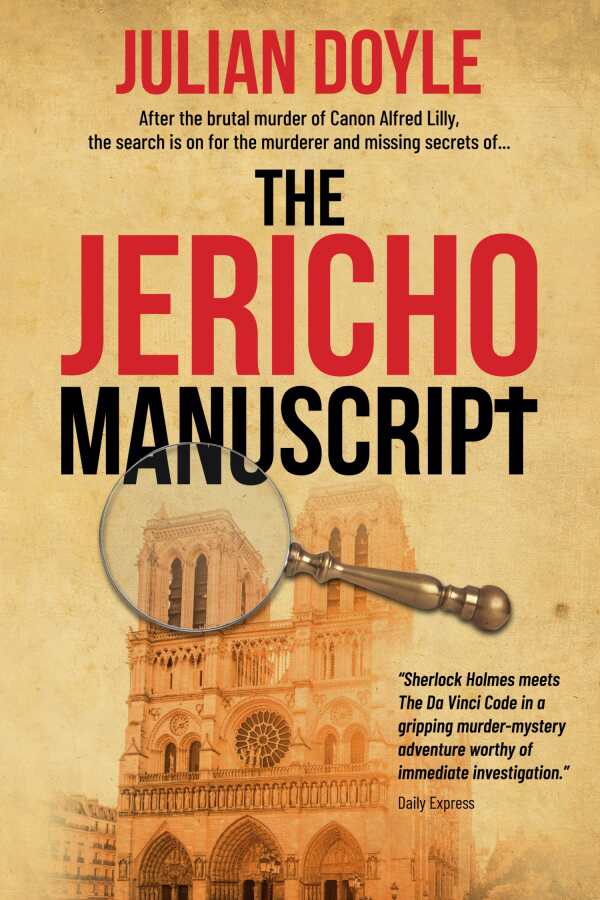The Jericho Manuscript
The Jericho Manuscript is a compelling Sherlock Holmes mystery novel whose turns are worthy of the famed detective.
In Julian Doyle’s mind-bending novel The Jericho Manuscript, detectives Sherlock Holmes and John Watson confront inconsistencies in the biblical story of Jesus.
A clergyman’s murder and a stolen manuscript send Holmes and Watson to Paris in search of the killer thief. But Holmes is more interested in the manuscript itself: it includes an alternative version of Mark 10:46 and the travels of Jesus. Holmes and Watson chase the killer and the manuscript across France, moving through idyllic seaside towns, quaint bookshops, ornate abbeys, and nights at the opera. All the while, Holmes’s time around a growing collection of books and his careful reading uncover contradictions and omissions about the story of Jesus from Muslim, Jewish, and Christian perspectives. Combined with his analysis of Christian art and architecture—including the works of Leonardo da Vinci—and helpful telegrams from his brother, Holmes begins to unravel a mystery nearly two millennia in the making.
Written in the style of a classic Holmes mystery, this book is filled with charming nods to the source material. Holmes is an apt swimmer, an expert in tobacco, a drug user, and a friend of Oscar Wilde—a nod to Sir Arthur Conan Doyle’s real-life friendship with the author. The detective mentions his desire to retire to the countryside and become a beekeeper, and he often quotes himself or refers to his earlier mysteries. And Holmes and Watson’s interactions are delightful. Watson’s increasing frustration at Holmes’s insistence to collect more books, thus making his luggage heavier and heavier, is wonderful and endearing. Throughout their travels, the duo come to realize how much they enjoy themselves. Holmes even jokes that Watson should name the story “Holmes on holiday,” a reference to their lavish, luxurious trip full of good food, good wine, and a delicious mystery.
However, several chapters do little to propel the story forward. For example, some of the conversations between Holmes and Watson are ungrounded, with the men talking back and forth sans surrounding descriptions or imagery. Some plot-friendly conveniences also impede it—most notably, the talkative strangers whom the men encounter, who are not only willing to accommodate the detectives but also happen to drop the right clues at the right time. Further, the mystery ends with a puttering whisper rather than a grand reveal, and even Watson cannot hide his disappointment—to which Holmes replies, “My dear Watson, you are dealing with real life here, not some amateur detective story.”
But to its credit and appeal, this historical tale is also infused with contemporary sensibilities: Holmes himself is often a stand-in for a more modern perspective. For example, when Watson expresses discomfort at Jesus’s “passionate love” for another man, Holmes notes: “Roman times were different, our present obsession with sodomy makes everyone guard every word they mutter.” Further, the book opens and ends with a metafictional wink: its introduction explains that John Watson wanted the story published a century after writing it, fearing that the blasphemous nature of Holmes’s findings would put a price on both their heads. It also reminds readers that Watson wrote his book in another time period and therefore used outdated and sometimes offensive language. The ending includes an analysis of Holmes’s findings, too, revealing the real-world investigation behind Holmes’s fictional one.
The Jericho Manuscript is a compelling Sherlock Holmes mystery novel whose turns are worthy of the famed detective.
Reviewed by
Hannah Pearson
Disclosure: This article is not an endorsement, but a review. The publisher of this book provided free copies of the book and paid a small fee to have their book reviewed by a professional reviewer. Foreword Reviews and Clarion Reviews make no guarantee that the publisher will receive a positive review. Foreword Magazine, Inc. is disclosing this in accordance with the Federal Trade Commission’s 16 CFR, Part 255.

